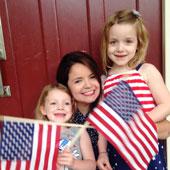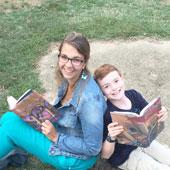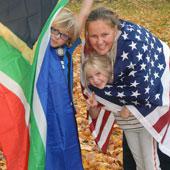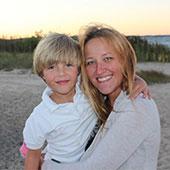Resources for Current Host Families
Overlapping Au Pairs
One Au Pair is leaving and a new one is arriving. Should they meet? Should the departing Au Pair help in training the new arrival? How do the children handle the transition? For expert advice on the advisability of overlapping Au Pairs, we turned to Community Counselors in the field.
Susan Brostowin in Massachusetts has had many families arrange an overlap of Au Pairs. Her advice is that the overlap should be no longer than a week as the new girl needs to settle in on her own. Susan says, “The other thing I require is that the ‘old’ girl must move out of the room into the spare room so that the new Au Pair can settle right in to her space. That is important. And of course, that does imply that the family must have space for both girls and that they shouldn’t bunk up in the same room!”
There are some definite advantages to overlap. The most obvious is that the departing Au Pair can participate in training the new arrival. Suzanne Rowley of Georgia reports that “;the new girls really enjoy having the old Au Pair show them the ropes!” A cautionary but optimistic note from Chris Fitch in Syracuse: “A positive and mature attitude on the part of the Au Pairs is critical to the success of the process.” It is important that the departing Au Pair be both cooperative and able to handle her own ambivalence about leaving in such a way that she doesn’t prejudice the new Au Pair against the Host Family, the Community Counselor or the children. Chris says that “an outgoing Au Pair who has the right attitude can be a great asset to orienting a new Au Pair, especially for busy Host Parents.” Lynn Kereji of Michigan points out that it is helpful for the Host Parents to be very specific about what the departing Au Pair should include in her training and not just leave it to the Au Pair’s judgement. She can be a great asset in showing the new Au Pair the best routes to school, the market, after school activities and the library, as well as other destinations that might be important for the Au Pair’s personal happiness (the post office, the drugstore, etc.). Lynn states, “They need to have their expectations very clear so when the old Au Pair leaves, the new Au Pair will be doing what the Host Family was expecting.” There can be too much of a good thing, however. Midge Hickford of Texas says, “The bad things in overlap happen when the Host Parents do not take part in the transition, when they leave it all up to the outgoing Au Pair to do all the work of orienting the new one.”
In addition to the opportunity to have one Au Pair train the next, an overlap can be used in creative and beneficial ways. Etta Rosen of Massachusetts suggests that during the transition time the two Au Pairs can be delegated different responsibilities. Perhaps they can divide responsibility for the children to give the new Au Pair a chance to build a relationship and simultaneously provide the opportunity for the old Au Pair to do a special activity, giving each child undivided attention. The new Au Pair can be eased into her duties. Perhaps the old Au Pair can do the household chores so the new Au Pair can concentrate on the children. An overlap can also allow the Host Parents to spend time with the new Au Pair during her scheduled work hours without the children to discuss the child care questionnaires and the family’s expectations.
Despite all the benefits, there is often some risk involved. As Pat Jacob of Illinois explains, no matter how good the previous Au Pair is, there will be some tension in the situation coming from several different factors. The old Au Pair has farewell parties, and it can be difficult for a Host Family to welcome the new Au Pair while going through the farewell rituals with the old Au Pair. Also, the old AP may have certain privileges that have been earned during the year, such as extensive car usage, and the Host Family may want to do some things differently the next time. Once the two Au Pairs talk, the Host Family cannot easily change the ground rules. The newcomer may wonder why she is not being treated the same.
It is also important to think about the implications for the children. Children are usually attached to their old Au Pair and may be suspicious or tentative with a newcomer. Alternatively, they may be immediately drawn to the new Au Pair just by virtue of her being a novelty, and they may reject the old Au Pair, creating hard feelings. Sometimes the transition can be tricky, but nonetheless, Barbara Schmidt in Oregon says, “It is a very good idea, but effort must be made so that the children understand that there is no alternative other than acceptance of the new person.”
Overlap can make adjustment difficult for a new Au Pair who feels that she can’t measure up to the departing Au Pair. It is easy to forget that her predecessor had twelve months to get to the point where she is now. Reassurance from the Host Family is of critical importance. Midge Hickford of Texas points out that “if the family is positive and kind and supportive to the outgoing Au Pair, that makes the new one feel even more confident that she chose a really good family.” What a great way to ease anxiety!





















